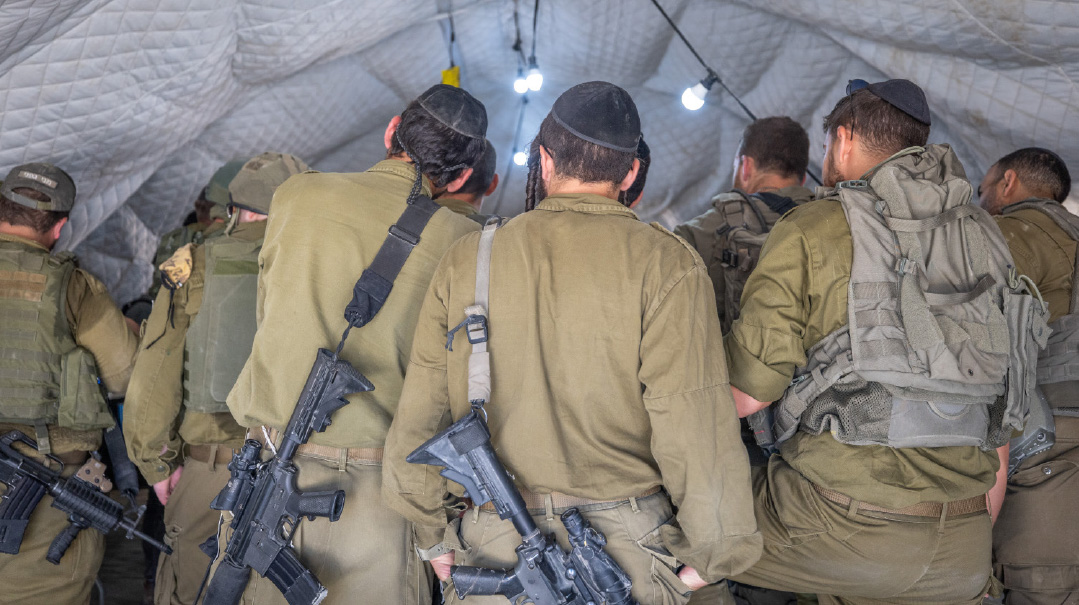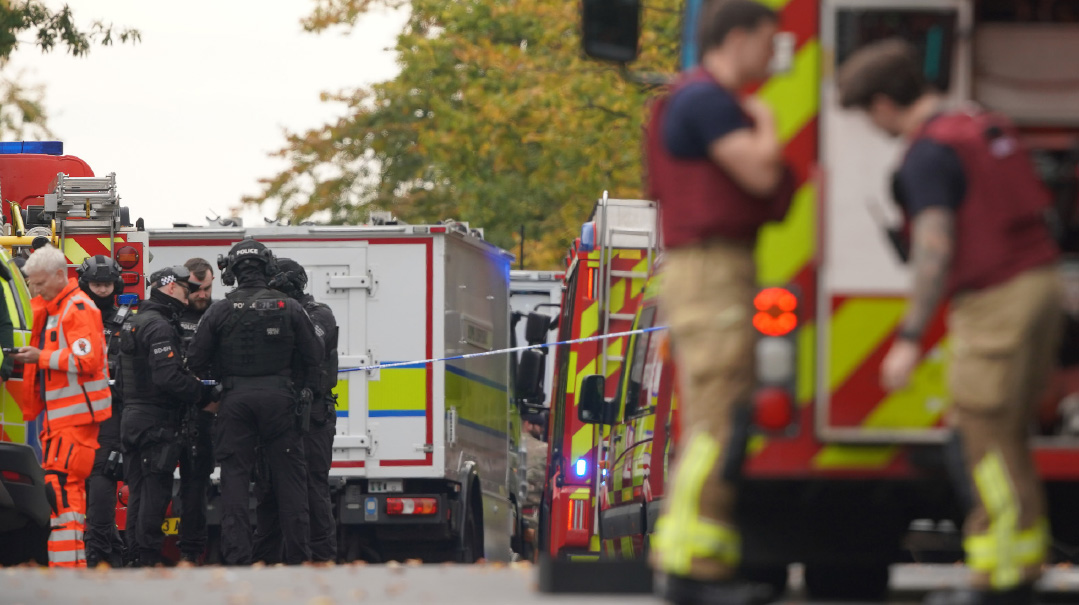Front Lines

To state the obvious, we’ve just survived the confrontation that decades of Israeli strategists feared — a showdown with mighty Iran
1.
I’M not picky when it comes to my work conditions. Decrepit, gap-toothed laptop; one-armed Captain Hook swivel chair; intermittent Wi-Fi — I can handle them all. But even I have standards. My red line is working in an office being targeted for annihilation by Iran’s Revolutionary Guards.
I’m sensitive like that. It’s just too far out of my comfort zone.
Those are precisely the conditions under which we produced the magazine two weeks ago — just three days into the war. After the Israeli Air Force memorably interrupted Iran’s main news broadcast with some pyrotechnics on that Monday afternoon, the Iranians published a picture of 35 Kanfei Nesharim — which happens to be the building that we share with Kan, Israel’s national broadcaster.
Accompanied by one of those bloodcurdling End-of-Days Farsi pronouncements, it promised that our building would be annihilated in time for the nine o’clock news.
In our post-Working from Home age, most staff were subsequently told to work from home. So at the time, only a basic editorial and graphics team were privileged to be working from the office on closing day. The term skeleton staff has never sounded so literal.
One thing I will say: Knowing that Tehran’s rocketeers might be taking a potshot with a ballistic missile does wonders for productivity. Forget idle water cooler conversations. By the time 7:45 p.m. rolled around, we were out of the revolving doors faster than a cloth-capped paperboy delivering an Extra!
As I made my way home, it occurred to me that we all deserve a campaign medal for producing newspapers under fire. Stiff upper lip and all that. Our laudable commitment to journalism deserves to be recognized with a Hemingway or Pulitzer, or whichever gong they hand out to war reporters nowadays.
I share with you this insight into that Monday because of what came this week. I walked in to the office expecting to find it abuzz with war-related reminisces and play-by-play accounts of how we practically typeset the magazine by hand under the meager light of a few flickering candles.
Absolutely nothing of the kind. No one commented on the previous two weeks’ work conditions. Raising the subject with Israeli colleagues, I felt like the person who breezes into the office two weeks after Yom Tov and asks coworkers, “How was your Pesach?”
Israelis always have a ho-hum attitude in the aftermath of near-disaster. It’s a coping mechanism for living so close to the precipice.
But in this case, we can’t simply move on as if it was just another mowing-the-grass operation against a local terror group.
To state the obvious, we’ve just survived the confrontation that decades of Israeli strategists feared — a showdown with mighty Iran. Their nuclear program has been set back, their ballistic missiles failed to overwhelm our defenses, and the leader of the world’s superpower came to our rescue.
It may well be only the opening promo. But alongside the fear and suffering, Hashem has shown us kindness on an unbelievable scale. That story deserves a place in the pantheon of Jewish history.
Surely, this time, we can’t just move on?
2.
An unfortunate side-effect of working in the news business is the inability to react normally to the news. Everything is filtered through the lens of coverage. There’s no “Did you hear what happened?” It’s all “Will it be a story next week?”
So when Trump announced the ceasefire well past midnight on Monday Israel time, first came relief, quickly followed by: “There goes our magazine.”
With a full 50 percent of the issue dedicated to a war that no longer existed, I was left thinking ruefully that it would have been better to call it the Esrogim After Succos edition.
It wasn’t that we failed to read the runes; when we closed for print, literally no one was talking of a ceasefire. The suddenness of it all was incredible. We went to sleep at war, and woke up to peace.
My daughter’s principal put it best. “That’s how Mashiach will come,” she told the girls. “One moment we’ll be in a world without, the next it will be a world transformed.”
Not for the first time, it was a thought anchored in that very day’s Daf Yomi. The Gemara (Sanhedrin 97a) says that three things come upon a person unawares: Mashiach, a metziah, and a scorpion. The Maharsha explains that the latter two are actually different ways in which the former can come about.
If we merit it, then Mashiach will come about as a metziah — a pleasant surprise. If not, it will catch us unpleasantly unprepared, like a scorpion bite.
So, did we miss the news of the week? Yes — but its absence was itself the story.
3.
Thatcher-Reagan, Clinton-Blair, Brexit-Trump — the umbilical cord connecting American and British politics is a well-established feature of two related cultures.
This week gave us another split-screen example of the parallels between the two countries, in the shape of one election and one rock concert.
The rise of anti-Israel progressive Zohran Mamdani as mayor-in-waiting of New York is documented in this week’s cover story. To British eyes, the soft-spoken socialist looks like a sympathetic, electable version of Jeremy Corbyn. Same anti-Israel, far-left positions — just in an electable package.
Where Corbyn looks like an unpleasant radical, Mamdani has the sympathetic bedside manner of a good doctor. “This won’t hurt very much…” he’ll say soothingly as he bans an Israeli trade delegation.
Across the pond, the type of people who voted for Mamdani were busy raving at Glastonbury, a festival of the performing arts with a tradition of left-wing activism.
In a world where calls for Israel’s destruction in the streets of Western capitals is non-news, it was still shocking to see hundreds of young people join in a thumping chant of “Death, Death to the IDF.”
Brendan O’Neill, a leading pro-Israel voice, wrote in the Spectator that it felt like “a woke Nuremberg rally,” part of “the bourgeois cult of Palestinianism.”
The BBC is now under fire for broadcasting the event live, and not cutting away from the sick performance. But no one expects any better from that bigotry-addled excuse for a news organization.
The trans-Atlantic nature of the progressive threat is a sign of how deep the rot is in Western culture. These aren’t just a few lefty students — they’re large numbers of fanatically intolerant young people, poisoned by decades of warped education.
These are people whose attitudes dominate massive media organizations like the BBC, and who increasingly dictate mainstream opinion in Western left-wing parties.
The war over Israel is the front-line in a struggle for the soul of Western society, as people like Brendan O’Neill know.
Amid the sirens and missiles, Hashem will look after us over here — there’s no such guarantee for the future of the West.
(Originally featured in Mishpacha, Issue 1068)
Oops! We could not locate your form.







